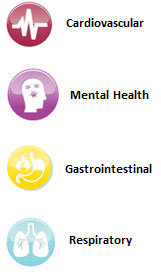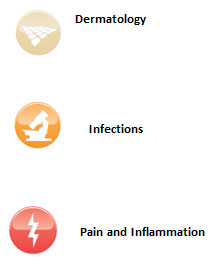Generics
Generic medicines are medicines that have the same active ingredients as the originator medicine but are usually more affordable.
Adcock Ingram manufactures generic medicines which are registered for quality, safety and efficacy. Adcock Ingram is one of South Africa’s leading manufacturers of generic medicines and has been providing healthcare solutions for over a century.
Our product list includes treatments for the most commonly occurring diseases and disorders and we have several generics that have become leaders in the generic category.
Adcock Ingram strives to bring you affordable generic medicines of the highest quality. We believe in adding value to you and your loved ones and therefore offer a range of quality medicines which you can depend on.
Adcock Ingram Generics - It’s a matter of trust.
Ask your pharmacist for an Adcock Ingram generic medicine the next time you fill a prescription.
What is a generic medicine?



Adcock Ingram manufactures generic medicines which are registered for quality, safety and efficacy. Adcock Ingram is one of South Africa’s leading manufacturers of generic medicines and has been providing healthcare solutions for over a century.
Our product list includes treatments for the most commonly occurring diseases and disorders and we have several generics that have become leaders in the generic category.
Adcock Ingram strives to bring you affordable generic medicines of the highest quality. We believe in adding value to you and your loved ones and therefore offer a range of quality medicines which you can depend on.
Adcock Ingram Generics - It’s a matter of trust.
Ask your pharmacist for an Adcock Ingram generic medicine the next time you fill a prescription.
 | 
|
A generic medicine is a medicine that is comparable to an originator branded medicine in dosage form, strength, quality and performance characteristics and intended use. An originator brand usually means the brand owned by the research company that did the research to develop the medicine in the first place.
The World Health Organisation (WHO) describes a generic medicine as follows:
'A generic drug is a pharmaceutical product, usually intended to be interchangeable with an innovator product, that is manufactured without a licence from the innovator company and marketed after the expiry date of the patent or other exclusive rights.'
WHO website
In order to register a generic medicine, the manufacturer has to prove bioequivalence with the originator medicine. This means that the amount of drug found in the blood of the patient after taking the generic medicine should be at least the same as that found when taking the originator medicine. This indicates that the effectiveness of the two medicines - generic and originator - should be the same. it can then be said that the medicines are bioequivalent.
When registering a generic medicine in South Africa, the same standards apply to the manufacturing and quality assurance of these medicines as apply to the originator medicines.
Generic medicines are usually sold at a more affordable price. in South Africa a pharmacist filling a prescription is required to inform a patient of the benefits of generic medicines, and then substitute a generic medicine for the originator medicine prescribed, unless the patient refuses the substitution.
What is the benefit of generic medicines?
The World Health Organisation (WHO) describes a generic medicine as follows:
'A generic drug is a pharmaceutical product, usually intended to be interchangeable with an innovator product, that is manufactured without a licence from the innovator company and marketed after the expiry date of the patent or other exclusive rights.'
WHO website
In order to register a generic medicine, the manufacturer has to prove bioequivalence with the originator medicine. This means that the amount of drug found in the blood of the patient after taking the generic medicine should be at least the same as that found when taking the originator medicine. This indicates that the effectiveness of the two medicines - generic and originator - should be the same. it can then be said that the medicines are bioequivalent.
When registering a generic medicine in South Africa, the same standards apply to the manufacturing and quality assurance of these medicines as apply to the originator medicines.
Generic medicines are usually sold at a more affordable price. in South Africa a pharmacist filling a prescription is required to inform a patient of the benefits of generic medicines, and then substitute a generic medicine for the originator medicine prescribed, unless the patient refuses the substitution.
The increase in the cost of healthcare outstrips inflation throughout the world. Efforts are being made everywhere to reduce healthcare costs while continuing to maintain standards. One way to reduce these costs without compromising the quality of medical care is to substitute originator medicines with generic medicines.
It is now law for pharmacists and doctors to inform patients about generic medicines and then to substitute a less expensive generic medicine for an originator medicine on every prescription, unless the patient refuses the substitution. The intention is to make sure that effective medicines stay within the reach of the majority of people living in South Africa and to improve access to healthcare.
In order to comply with the law in substituting an originator medicine with a generic medicine:
How would I get generic medicines?
It is now law for pharmacists and doctors to inform patients about generic medicines and then to substitute a less expensive generic medicine for an originator medicine on every prescription, unless the patient refuses the substitution. The intention is to make sure that effective medicines stay within the reach of the majority of people living in South Africa and to improve access to healthcare.
In order to comply with the law in substituting an originator medicine with a generic medicine:
- The active ingredient of the generic must be exactly the same as the original molecule
- The generic must be administered in exactly the same way as the prescribed originator medicine e.g. oral or injection route of administration
- The dosage form must be the same e.g. tablet or capsule
- The same effect with regards to efficacy and safety must be obtained by the patient
When doctors and pharmacists dispense a prescription medicine, they are required by law to inform patients of the benefits of generic medicines and to substitute a less expensive generic medicine for the prescribed originator medicine, unless the patient refuses the substitution.
As an individual you have the right to request a generic medicine. For example, if you are on chronic or long term medication for conditions such as hypertension or high cholesterol, the savings could be significant.
As an individual you have the right to request a generic medicine. For example, if you are on chronic or long term medication for conditions such as hypertension or high cholesterol, the savings could be significant.
-
Are all generic medicines the same?
The active ingredients and the amount thereof in any generic substitute are required to be the same as the original product. Only once it has been tested and proven to be as effective, known as bioequivalence testing, will the product be registered and available for sale through a pharmacy. This means that there may be many different generics of an originator medicine available, which are produced by different companies. -
Can I refuse generic medicines?
It is important that a patient takes the advice of the doctor or pharmacist. In terms of the law a patient may refuse the substitution of a generic medicine if there is a good reason to do so.


